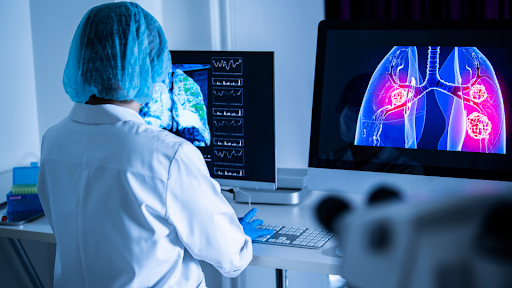Pneumonia is a serious respiratory condition that can affect individuals of all ages. It is characterized by inflammation of the lung tissue, typically caused by infections from bacteria, viruses, or fungi. Given its potential severity, many individuals wonder where they should seek medical attention if they suspect they have pneumonia. Urgent care centers have become increasingly popular for addressing various health concerns, but can they effectively diagnose pneumonia? This article explores the capabilities of urgent care facilities in diagnosing pneumonia and offers insights into alternative options for medical consultations.
 Understanding Pneumonia
Understanding Pneumonia
Before diving into the role of urgent care in diagnosing pneumonia, it is essential to understand what pneumonia is and its symptoms. Pneumonia can manifest in various forms, with symptoms that range from mild to severe. This respiratory infection can affect one or both lungs and is often characterized by inflammation of the air sacs, which may fill with fluid or pus, leading to difficulty in breathing and reduced oxygen exchange in the bloodstream.
Common Symptoms of Pneumonia
The symptoms of pneumonia can vary based on the causative agent and the individual's overall health. Common symptoms include:
Individuals experiencing these symptoms should seek medical attention promptly. Early diagnosis and treatment are crucial to prevent complications. In some cases, pneumonia can lead to serious issues such as respiratory failure, sepsis, or even death, particularly in vulnerable populations such as the elderly or those with pre-existing health conditions. It is also important to note that symptoms may develop gradually or suddenly, and some individuals may experience confusion or altered mental status, especially older adults.
Types of Pneumonia
Pneumonia can be classified into several types, including:
Community-acquired pneumonia (CAP): This type occurs outside of healthcare settings and is often caused by bacteria or viruses.
Hospital-acquired pneumonia (HAP): This occurs during hospital stays and can be more severe due to antibiotic-resistant bacteria.
Aspiration pneumonia: This type occurs when food, liquid, or vomit is inhaled into the lungs.
Understanding the type of pneumonia can help healthcare providers determine the appropriate treatment plan. For instance, CAP is commonly treated with oral antibiotics, while HAP may require more aggressive treatment strategies, including intravenous antibiotics and additional supportive care. Aspiration pneumonia, on the other hand, often necessitates a careful assessment of the patient's swallowing ability and may involve a multidisciplinary approach to prevent future occurrences. Additionally, recognizing risk factors such as smoking, chronic lung diseases, and weakened immune systems can aid in both the prevention and management of pneumonia.
The Role of Urgent Care in Diagnosing Pneumonia
Urgent care centers are designed to provide immediate medical attention for non-life-threatening conditions. They are often more accessible than traditional emergency rooms and can handle a variety of health issues, including respiratory infections like pneumonia.
Capabilities of Urgent Care Centers
Urgent care facilities are equipped to perform a range of diagnostic tests that can help identify pneumonia:
Physical Examination: Healthcare providers will conduct a thorough physical exam, including listening to the lungs with a stethoscope to detect abnormal sounds such as wheezing or crackling.
X-rays: Chest X-rays are commonly used to visualize the lungs and confirm the presence of pneumonia.
Lab Tests: Blood tests or sputum cultures may be ordered to identify the causative agent of the infection.
While urgent care centers can diagnose pneumonia, they may not always have access to advanced imaging or laboratory facilities, which can limit their ability to provide comprehensive care. In such cases, if pneumonia is suspected but not definitively diagnosed, urgent care providers may refer patients to a hospital for further evaluation and treatment. This collaborative approach ensures that patients receive the most accurate diagnosis and appropriate care based on the severity of their condition.
When to Visit Urgent Care
Individuals should consider visiting an urgent care center if they exhibit mild to moderate symptoms of pneumonia. Urgent care is particularly suitable for:
Patients without a primary care physician
Those seeking a quick evaluation for respiratory symptoms
Individuals who cannot access emergency services
However, if symptoms are severe—such as high fever, difficulty breathing, or chest pain—visiting an emergency room may be more appropriate. Additionally, urgent care centers often have extended hours, making them a convenient option for patients who may experience symptoms outside of regular office hours. This accessibility is especially beneficial for working individuals or parents with children who may fall ill unexpectedly. Furthermore, many urgent care centers now offer telehealth options, allowing patients to consult with healthcare providers remotely, which can be particularly useful for those who are hesitant to visit in person due to ongoing health concerns.
Limitations of Urgent Care for Pneumonia Diagnosis
While urgent care centers can provide valuable services, there are limitations to their capabilities when it comes to diagnosing pneumonia.
 Access to Specialists
Access to Specialists
Urgent care centers typically do not have specialists on-site, which can be a drawback for patients requiring specialized care. If a patient is diagnosed with pneumonia, they may need a referral to a pulmonologist or other specialist for further evaluation and treatment. This can lead to delays in receiving the appropriate level of care, especially if the urgent care center is unable to facilitate a timely referral. Moreover, the lack of immediate access to specialists means that complex cases, such as those involving patients with underlying health conditions or atypical pneumonia, may not receive the comprehensive assessment they need right away.
Follow-Up Care
Another limitation is the follow-up care that urgent care centers can provide. Patients diagnosed with pneumonia may require ongoing monitoring and treatment adjustments, which are often better managed by a primary care physician. In many cases, pneumonia can lead to complications, such as pleural effusion or respiratory failure, necessitating close observation and potentially more intensive treatment. Urgent care facilities may not have the resources to monitor these evolving situations effectively. Furthermore, patients may find themselves needing to navigate the healthcare system to schedule follow-up appointments, which can add to their stress and complicate their recovery process.
Diagnostic Limitations
In addition to the challenges related to specialist access and follow-up care, urgent care centers may also face limitations in diagnostic capabilities. While they often have basic imaging technology, such as portable X-ray machines, they may lack advanced imaging options like CT scans that can provide a more detailed view of the lungs. This can hinder the accurate diagnosis of pneumonia, particularly in cases where the infection is not straightforward. Additionally, urgent care providers may not have access to the full range of laboratory tests needed to identify the specific pathogen causing the pneumonia, which can be crucial for determining the most effective treatment plan.
Time Constraints
Time constraints in urgent care settings can further exacerbate these limitations. Due to the high volume of patients they typically serve, healthcare providers may have limited time to spend with each patient. This can result in rushed evaluations and insufficient discussions about symptoms, medical history, and lifestyle factors that could influence treatment decisions. A thorough assessment is particularly important for pneumonia, as the condition can vary significantly in severity and presentation. Inadequate time for patient interaction may lead to missed opportunities for education about the illness, its management, and preventive measures, leaving patients feeling uncertain about their health and recovery.
Alternative Options for Diagnosis and Treatment
Telehealth services have emerged as a convenient and effective option for those seeking alternatives to urgent care for pneumonia diagnosis. Platforms like Doctronic offer AI-powered consultations that can help patients receive timely medical advice from the comfort of their homes.
Benefits of Telehealth for Pneumonia
Telehealth services provide several advantages for individuals suspecting they may have pneumonia:
Accessibility: Patients can consult with healthcare professionals without needing to travel, making it easier for those with respiratory symptoms.
Convenience: Telehealth consultations are often available 24/7, allowing patients to seek care at their convenience.
Comprehensive Care: Services like Doctronic utilize AI to analyze symptoms and provide personalized recommendations based on the latest medical research.
By leveraging telehealth, patients can receive a preliminary diagnosis and treatment plan, which can then be taken to a primary care physician or specialist for further care if necessary.
In addition to these benefits, telehealth can significantly reduce the risk of spreading infections, particularly pneumonia, which can be contagious. By staying at home, patients not only protect themselves but also help safeguard others in their community. Moreover, telehealth platforms often provide educational resources that empower patients to understand their condition better. These resources can include information on pneumonia symptoms, preventive measures, and lifestyle changes that can enhance recovery and overall lung health.
Furthermore, telehealth can facilitate follow-up consultations, ensuring that patients remain engaged in their treatment plan. Regular check-ins with healthcare providers can help monitor progress and adjust medications or therapies as needed. This ongoing support is crucial for managing chronic conditions or complications that may arise from pneumonia, making telehealth an invaluable tool in modern healthcare.
Pneumonia Care Starts with Timely Diagnosis
In summary, urgent care centers can diagnose pneumonia and provide immediate care for individuals experiencing respiratory symptoms. However, they may have limitations regarding access to specialists and follow-up care. For those seeking a more comprehensive approach, telehealth services like Doctronic offer a modern solution that combines convenience with quality medical advice. Whether opting for urgent care or telehealth, early diagnosis and treatment remain crucial in managing pneumonia effectively.
24/7 Care, One Click Away
When it comes to managing your health, timely and personalized care is paramount. Doctronic is at the forefront of healthcare innovation, offering free AI doctor visits that provide you with an immediate diagnosis to take to any doctor for further assistance. Our telehealth video visits connect you with real doctors 24/7, ensuring that you receive the care you need, when you need it, in all 50 states. With over 10 million satisfied users, Doctronic is the smarter, faster, and more personal healthcare solution. Don't wait in line or worry about office hours; talk to an AI Doctor now, for free, and experience the most modern medicine at your convenience.



 Understanding Pneumonia
Understanding Pneumonia Access to Specialists
Access to Specialists